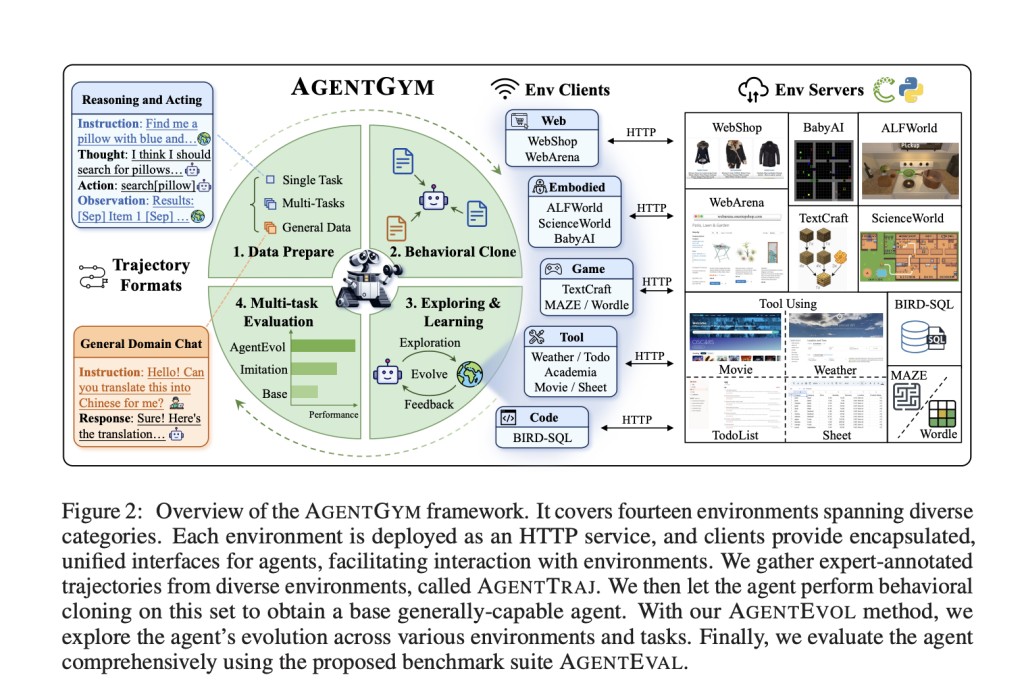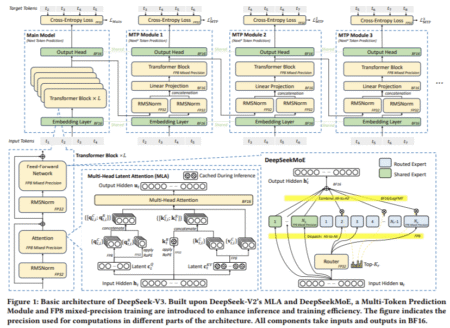Artificial intelligence (AI) research has long aimed to develop agents capable of performing various tasks across diverse environments. These agents are designed to exhibit human-like learning and adaptability, continuously evolving through interaction and feedback. The ultimate goal is to create versatile AI systems that can handle diverse challenges autonomously, making them invaluable in various real-world applications.
A significant challenge in AI is creating agents that can generalize across different tasks and environments without extensive human intervention. Current methods often require detailed supervision, which limits scalability and adaptability. The problem lies in developing an autonomous system that can learn and improve independently, enhancing its ability to perform diverse tasks without constant human oversight.
Existing research includes frameworks like AgentBench, AgentBoard, and AgentOhana, which focus on evaluating and developing large language model-based agents. These frameworks typically involve behavioral cloning from expert trajectories or isolated environment training, which limits scalability and generalization. Models such as GPT-3.5-Turbo, GPT-4-Turbo, and Llama-2-Chat have been explored for these purposes. Other significant contributions include ReAct and self-improvement approaches, which train agents through environmental feedback and interactive learning.
Researchers from Fudan NLP Lab & Fudan Vision and Learning Lab introduced the AGENTGYM framework. This innovative framework supports diverse environments and tasks, enabling agents to explore broadly and in real time. AGENTGYM provides a comprehensive suite of tools and environments for training and evaluating large language model-based (LLM-based) agents, facilitating their evolution and generalization across tasks. The framework aims to enhance the adaptability and performance of AI agents by providing a more robust training environment.
The AGENTGYM framework includes a platform with various environments and tasks, a database of expanded instructions, and a set of high-quality trajectories. It employs a novel method called AGENTEVOL, which allows agents to evolve by interacting with different environments and learning from new experiences. This method enhances the agents’ ability to generalize and adapt to new tasks. The framework also includes a benchmark suite, AGENTEVAL, for evaluating the performance and generalization abilities of the agents. The researchers collected diverse instructions from various environments, expanding them through crowdsourcing and AI-based methods. This comprehensive dataset forms the basis for training and evaluating the agents.
Experimental results demonstrate that agents evolved using AGENTEVOL perform comparably to state-of-the-art models across various tasks. The evolved agents significantly improved their ability to generalize and adapt to new tasks and environments. For instance, the agents achieved success rates of 77.0% in WebShop and 88.0% in ALFWorld, outperforming several baseline models. The framework’s ability to integrate diverse instructions and tasks into the training process has resulted in agents that are more versatile and capable of handling a broader range of challenges. These results highlight the potential of AGENTGYM to advance the development of generalist AI agents, making them more effective and efficient in real-world applications.
In conclusion, the AGENTGYM framework, a significant stride in the creation of generally-capable AI agents, owes its success to the pioneering work of the research team from Fudan NLP Lab & Fudan Vision and Learning Lab. By enabling autonomous evolution across diverse environments, the framework overcomes key limitations of current methods. The innovative approach and promising results herald a bright future for AI research in developing versatile and adaptable agents. The research team’s substantial contributions to the field, particularly their work on AGENTGYM and AGENTEVOL, demonstrate the potential of integrating diverse environments and autonomous learning methods to create more capable and generalist AI agents.
Check out the Paper. All credit for this research goes to the researchers of this project. Also, don’t forget to follow us on Twitter. Join our Telegram Channel, Discord Channel, and LinkedIn Group.
If you like our work, you will love our newsletter..
Don’t Forget to join our 44k+ ML SubReddit
The post From Limited Tasks to General AI: AGENTGYM Evolves Agents with Diverse Environments and Autonomous Learning appeared first on MarkTechPost.
Source: Read MoreÂ

